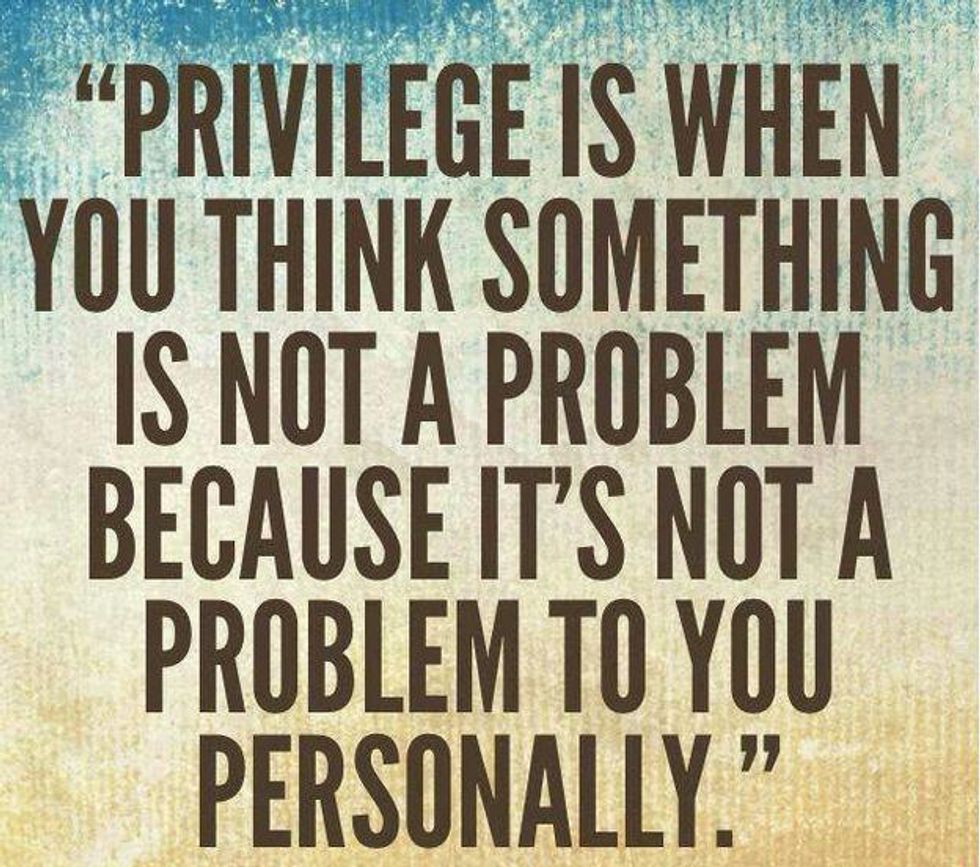If you you’ve been remotely clued in to the the news for the last few years, you’ve probably heard of white privilege. It has become somewhat of a buzzword, one with a bad reputation. Depending on your background, ethnicity, personal experience and what you’ve heard about it, you may feel a number of different ways. Opinions about privilege range from, “It doesn’t exist,” to “It’s the source of all the world’s problems.”
Let's break down what privilege really is, if you have it and how we can use the power of privilege to make real change. First, privilege is real. In fact...
You may be privileged if you’ve ever captioned a Facebook post with #blessed. You may be privileged if you’ve ever gotten out of a speeding ticket by batting your eyes and apologizing. You may be privileged if you’ve never been unnecessarily profiled by airport security. You may be privileged if you’ve ever gotten a job over other applicants who were more qualified than you, because of your appearance or race. You may be privileged if you've never been discriminated against because of your ethnicity. Privilege can be anything from race to gender, wealth, nationality, sexuality, or level of attractiveness.
Second, just about everyone holds some sort of privilege. Privilege is a social advantage one has. For example, coming from a family wealthy enough to send you to college without having student loans would make you privileged. Growing up with English as your native language would be a privilege. However, being white can also be a privilege.
Most of us agree on privilege related to money, but when we talk about privilege related to ethnicity or gender, some of us get more uncomfortable. Take it from a white woman, being lectured about white privilege can be offensive because my ethnicity is something that I cannot possibly change. In addition, I can never know what life is like as a black or Latina woman, so how can I understand the disadvantages that come with that? How can I be held responsible for the racist acts of others? Answer: I can only be accountable for myself, but part of that involves understanding my privilege.
Can I be honest? Middle class suburban white people are not experts on racism. I’ve never had a mother tell me to stay away from her son because he “can’t date a black girl.” One of my close friends has been told this, though. I’ve never been classified a “thug” or “ghetto” because of my appearance. “Preppy?” Sure, but compared to being stereotyped as a criminal, that isn’t much of an insult is it?
I will never experience the same discrimination that some of my non-white friends face. And I may be given opportunities just because of my appearance. Those are privileges I have simply because of the way I was born. Based on my own life experience living in Mississippi, I can guarantee you that the prejudice many blacks face is far greater that people want to acknowledge. So why would I turn a blind eye when I have the ability to influence?
There are still huge disparities in wealth between blacks and whites, and that remains true whether or not you buy into Bill O’Reilly’s assertion that it’s all due to the “breakdown of the African American Family."
This is not a guilt strategy. This is not a call to charity. This is about awareness and empathy.
I’m not a particularly optimistic person; I believe that we will always have race issues in the United States. I do not think that we can solve any of our problems through social media campaigns or hashtags or the assault on innocent police officers that we’ve seen in the last few months. In my opinion, the most important action we can take is to understand why race relations in the U.S. are so strained and what position we hold in the racial dichotomy. It is honestly so frustrating to see people who refuse to believe the personal experiences of a certain people group just because they have never had the same experiences. Being ignorant of a problem doesn't mean it doesn't exist.
Having privilege doesn't exempt us from the problems that plague others. Being affronted by the truth doesn't excuse us from the conversation. I guess you could say that with great privilege comes great responsibility. We have to be empathetic enough to hear out people who have actually experienced racism and not immediately discredit them just because our experiences are different.
























